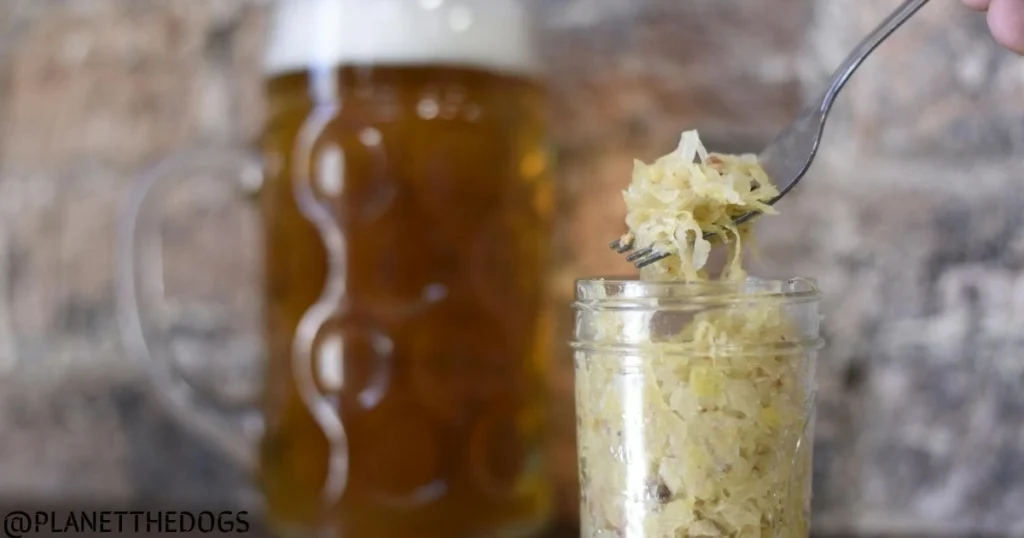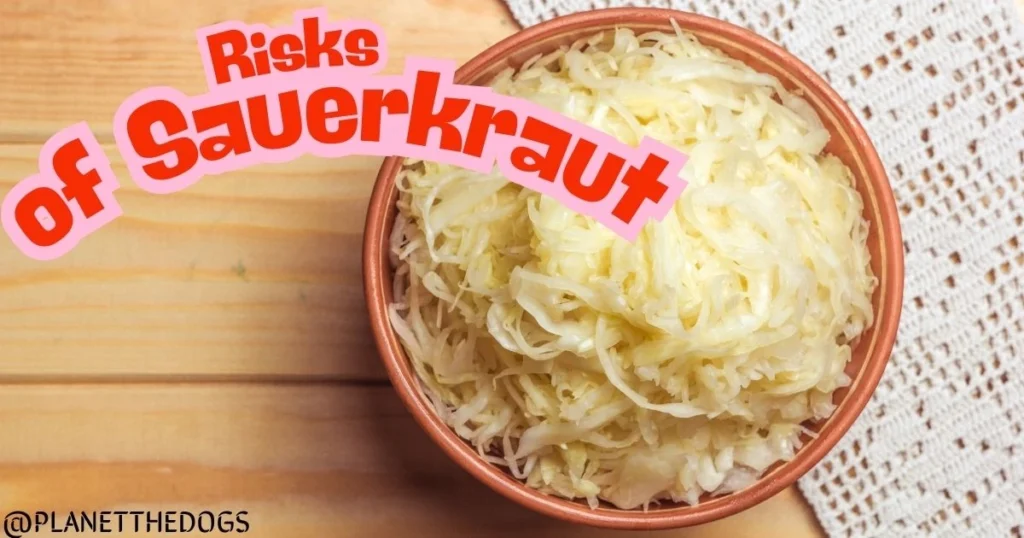Can Dogs Eat Sauerkraut? Amazing Benefits and Risks Explained
If you’re a dog owner thinking about adding sauerkraut to your pet’s diet, you’re not alone. This tangy, fermented treat is full of probiotics and nutrients that could help support your dog’s health. But, you might wonder: Can dogs eat sauerkraut?
In this article, we’ll explore the question, Can dogs eat sauerkraut? We’ll dive into its benefits and potential risks. Understanding these details will help you decide if sauerkraut is a good addition to your dog’s diet.
Table of Contents
Key Takeaways
- Sauerkraut may offer potential health benefits due to its probiotics and nutrients.
- It’s essential to consider if sauerkraut is safe for dogs before introducing it to their diet.
- There are both nutritional benefits and risks associated with feeding dogs sauerkraut.
- Understanding the differences between raw and processed sauerkraut is crucial.
- Monitoring your dog for any adverse reactions is important when trying new foods.
- Discussing any dietary changes with your veterinarian is always a recommended practice.
Understanding Sauerkraut and Its Ingredients

Sauerkraut is a fermented cabbage dish known for its tangy taste and health perks. It has a long history and is loved in many cuisines. We’ll explore its main parts, how it’s made, and its nutritional benefits.
What is Sauerkraut?
Sauerkraut is finely shredded cabbage that ferments, giving it a sour taste. This process makes it taste better and last longer. The fermentation uses natural bacteria, like Lactobacillus, which make it a probiotic-rich food.
Main Ingredients and Nutritional Profile
The main ingredients are cabbage and salt. Together, they create a flavorful dish. Sauerkraut is low in calories but rich in vitamins like C and K. It’s also full of dietary fiber, which is good for your digestion.
| Nutrients | Amount per 1 Cup |
|---|---|
| Calories | 27 |
| Protein | 1.1 g |
| Fiber | 4 g |
| Vitamin C | 47% of RDI |
| Vitamin K | 18% of RDI |
Fermentation Process and Its Effects
The fermentation turns raw cabbage into sauerkraut. It changes the cabbage’s sugars into lactic acid, thanks to the bacteria. This not only keeps the food fresh but also boosts its probiotic value. The good bacteria help your gut and overall health.
Can Dogs Eat Sauerkraut? An Overview

Dog owners often wonder if sauerkraut is safe for their pets. The question “can dogs eat sauerkraut” depends on the type of sauerkraut and the dog’s health. It’s important to consider how sauerkraut is made and what’s in it.
Is Sauerkraut Safe for Dogs?
When adding new foods to a dog’s diet, moderation is crucial. Sauerkraut can be safe for dogs if given in small amounts and made right. Always talk to a vet before changing your dog’s diet. Dogs with health problems might not do well with sauerkraut, especially if they’re sensitive to its acidity or have digestive issues.
For more about how to safely feed your dog, you can read our article on Dog Nutrition and Diet.
Differences Between Raw and Processed Sauerkraut
Raw sauerkraut and processed sauerkraut are different. Raw sauerkraut has natural probiotics that help with digestion. Processed sauerkraut, on the other hand, might have preservatives and too much sodium, which can be harmful. Here’s a comparison:
| Type of Sauerkraut | Probiotic Content | Sodium Levels | Added Preservatives |
|---|---|---|---|
| Raw Sauerkraut | High | Low | No |
| Processed Sauerkraut | Low | High | Yes |
Knowing these differences helps dog owners choose the right sauerkraut for their pets.
Benefits of Sauerkraut for Dogs
Looking into sauerkraut’s benefits for dogs shows how it boosts their health. It’s full of nutrients that help keep dogs well.

Nutritional Benefits of Sauerkraut
Sauerkraut is high in fiber, which is good for digestion. It also has vitamins C and K, and B vitamins. These help the immune system and keep dogs full of energy.
Adding sauerkraut to a dog’s diet can improve their nutrition. This can help them live longer and stay healthy.
Probiotics for Dogs: How They Help
Sauerkraut is packed with probiotics, which are good bacteria. These bacteria help keep a dog’s gut healthy. They make it easier for dogs to digest their food.
Feeding sauerkraut to dogs can help with digestion problems. This can make them happier and healthier.
To learn more about probiotics for dogs, check out this Probiotics for Dogs article from the American Kennel Club.
Sauerkraut and Dog Digestion
It’s important to know how sauerkraut affects a dog’s digestion. Fermented foods like sauerkraut help keep the gut balanced. This balance can reduce digestive problems and improve digestion.
This balance helps dogs get the nutrients they need. It helps them stay healthy and thrive.
| Nutritional Component | Benefit |
|---|---|
| Fiber | Promotes healthy digestion |
| Vitamin C | Boosts immune function |
| Vitamin K | Supports bone health |
| Probiotics | Enhances gut health and digestion |
Risks of Sauerkraut for Dogs
Feeding sauerkraut to dogs can pose risks that pet owners should know. Understanding these risks is key to keeping your furry friend healthy and happy.

Potential Health Risks
The main worry about sauerkraut for dogs is its health risks. While it’s nutritious, it can upset a dog’s stomach. This is especially true for dogs new to fermented foods.
Always watch for any unusual behaviors or changes when introducing new foods to your dog’s diet.
If your dog shows signs of an adverse reaction, read more on how to boil chicken for dogs, which can help settle their stomach.
Salt Content and its Implications
Sauerkraut’s high salt content is a big concern. Too much sodium can lead to serious health problems, like sodium ion poisoning. Symptoms can range from vomiting to seizures.
Keeping the amount of sauerkraut your dog eats in check can help avoid these issues. This way, your dog stays healthy and happy.
Signs of Adverse Reactions in Dogs
Dog owners should know the signs of bad reactions to sauerkraut. Common symptoms include:
- Gastrointestinal upset
- Excessive drooling
- Gas or bloating
- Allergic reactions such as itching or swelling
Being alert to these signs can help catch problems early. This allows for quick action to protect your pet’s health.
Serving Tips for Dogs
Adding sauerkraut to your dog’s diet can be very rewarding. It’s important to know how much to give to keep them healthy. The right amount depends on your dog’s size, how active they are, and their diet.

How Much Sauerkraut Can I Feed My Dog?
Begin with a small amount of sauerkraut in your dog’s meals. Small dogs should get one teaspoon a day. Medium dogs can have one tablespoon. Big dogs can have two tablespoons.
Watch how your dog reacts and adjust the amount if they have any stomach issues.
Homemade Sauerkraut for Dogs: A Safe Option
Making homemade sauerkraut for dogs is a healthy snack choice. It’s made by fermenting fresh cabbage. This way, you control what goes into it, making it safer than store-bought sauerkraut.
Dog-Friendly Fermented Foods
There are other fermented foods good for dogs besides sauerkraut. These can help their gut health. Some options are:
- Kefir
- Yogurt
- Kombucha (without sugar or caffeine)
- Fermented veggies like carrots or beets
Adding these to your dog’s diet can make it more varied and support their digestive health.
Conclusion
While dogs can eat sauerkraut in some cases, it’s important for owners to know the good and bad. Sauerkraut is full of probiotics, which help with digestion. But, it also has a lot of salt and can cause problems for some dogs.
When adding sauerkraut to your dog’s diet, do it slowly and watch for any bad reactions. It’s always best to talk to a vet before making any big changes. This way, your dog can stay healthy and enjoy new foods safely.
FAQ
Can dogs eat sauerkraut?
Yes, dogs can eat sauerkraut, but in small amounts. Watch how your dog reacts and talk to your vet if needed.
Is sauerkraut safe for dogs?
Sauerkraut can be safe for dogs if given in small amounts. But, think about your dog’s health before trying new foods.
What are the benefits of sauerkraut for dogs?
Sauerkraut is good for dogs because it has lots of fiber. It also has probiotics that help their gut health.
Are there risks of feeding sauerkraut to dogs?
Yes, there are risks, like too much salt. This can cause sodium poisoning. Watch for signs like upset stomach or allergies.
How much sauerkraut can I feed my dog?
Start with a small amount, like a teaspoon, based on your dog’s size. Adjust as needed and watch for any bad reactions.
Can dogs eat raw sauerkraut?
Yes, raw sauerkraut is better for dogs because it keeps its probiotics. It’s healthier than processed sauerkraut with bad additives.
What signs should I look for if my dog has an adverse reaction to sauerkraut?
Look for vomiting, diarrhea, gas, or allergies like itching or swelling. If you see these signs, see your vet.
Can I make homemade sauerkraut for my dog?
Yes, homemade sauerkraut is safe for dogs if made without too much salt or bad additives. It’s a healthy treat.
What other dog-friendly fermented foods are safe?
Safe foods include plain, unsweetened yogurt, kefir, and some pickled veggies. Just make sure they don’t have harmful stuff.








